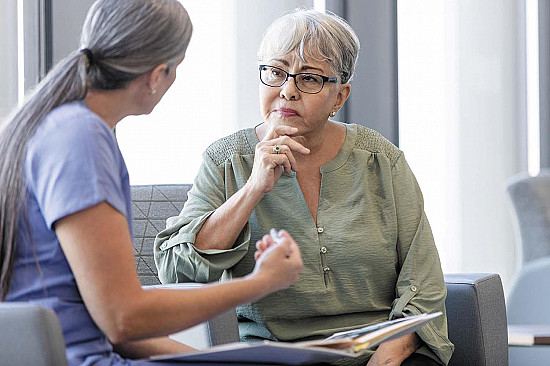Medicines to prevent breast cancer
|
Photo: Thinkstock How signicantly can breast cancer prevention drugs
Source: Nelson, et al. Annals of Internal Medicine, 2013 |
Many women who could benefit from breast cancer prevention drugs aren't taking them.
Many new and potent medicines to prevent breast cancer have become available in the past 20 years. Surprisingly, however, many women—even those at high risk for the disease—are not taking advantage of these medicines.
Drugs such as tamoxifen (Nolvadex), raloxifene (Evista), and exemestane (Aromasin) can reduce the odds of developing breast cancer for many women at risk. "These drugs have been shown to prevent the occurrence of invasive and pre-invasive breast cancers," says Dr. Paul Goss, director of breast cancer research at the Massachusetts General Hospital Cancer Center.
"It isn't just cancer that's prevented," Dr. Goss says. "It's precancer and abnormal mammograms. That leads to fewer biopsies. There are a lot of spin-off benefits."
Fear keeps usage low
Despite these benefits, the vast majority of women who are eligible to take breast cancer prevention drugs have shied away from them. Part of women's reluctance to use these drugs, and their doctors' reluctance to prescribe them, stems from worries over side effects such as blood clots and an increased risk for uterine cancer.
Dr. Goss says that, unlike side effects from drugs to lower blood pressure or cholesterol, risks from breast cancer prevention medicines are harder to justify because the benefits of the drugs aren't as obvious. "When you show a patient that their blood pressure today is lower than it was—that's a picture of triumph. It's why the patient is putting up with the side effects. I think that's the single biggest reason why breast cancer prevention hasn't prevailed," he says.
Yet, he says, these drugs have a long-established history of safety and effectiveness, because researchers studied them on women with breast cancer long before they even considered them for cancer prevention. "Tens of thousands of women have taken these medications worldwide, so the side effect profiles are extremely well defined."
Currently, three drugs in two classes are recommended for breast cancer prevention in postmenopausal women: two selective estrogen receptor modulators (SERMs)—tamoxifen (Nolvadex) and raloxifene (Evista)—and the aromatase inhibitor exemestane (Aromasin). All three drugs work on the most common type of breast cancer—estrogen receptor–positive breast cancer—which needs the hormone estrogen to grow.
Who should take these drugs
Certain women who are at very high risk for breast cancer should be considered for preventive drugs. These include women with
-
an inherited BRCA gene mutation
-
a history of radiation to the chest from another cancer (such as Hodgkin's disease or non-Hodgkin's lymphoma)
-
a personal history of breast cancer
-
a past breast biopsy that showed atypical ductal hyperplasia or lobular carcinoma in situ—precancerous conditions that increase the risk for invasive breast cancer.
Other groups of women—such as those who have a family history of breast cancer—are harder to identify as candidates. Expert groups recommend SERMs or aromatase inhibitors for all women who are at high risk for breast cancer based on their score on the National Cancer Institute Breast Cancer Risk Assessment Tool (to calculate your risk, visit www.cancer.gov/bcrisktool). However, the threshold score differs by organization:
-
The U.S. Preventive Services Task Force considers you at high risk if your five-year breast cancer risk score is 3% or higher.
-
The American Society of Clinical Oncology defines high risk as a score of at least 1.66%.
Although we understand more about factors that put women at higher risk for breast cancer and treatments that help protect high-risk women, there is not complete consensus on which women should seek preventive treatment. "I believe in the value of treatments to prevent breast cancer, but I'm not sure where the borders begin and end," Dr. Goss admits. Given this uncertainty, it's important for each woman to discuss with her doctor whether breast cancer prevention drugs are safe and reasonable for her to take, he says.
Women who are already at risk for blood clots or uterine cancer probably shouldn't take these drugs. It's also important to consider your quality of life while on the drug. "Typically with breast cancer prevention you're looking at long-term therapy—over years, rather than months. How you are going to feel over those years is important," Dr. Goss says. By blocking the effects of estrogen, these drugs can cause uncomfortable menopause-like symptoms, including hot flashes and vaginal dryness. Aromatase inhibitors also can weaken bones (a side effect that can be counteracted by taking bisphosphonate drugs).
If you do decide to take one of these medicines, here's one definite advantage: the cancer-reducing benefits will continue long after you go off it. "If you take five years of breast cancer prevention medication, you're left with a permanently reduced risk of breast cancer. That's like an insurance policy," Dr. Goss says.
Breast cancer prevention drugs |
||||
|
Class |
Generic name (brand name) |
Recommended dose, duration |
Effectiveness |
Potential side effects |
|
SERM |
Tamoxifen (Nolvadex) |
20 mg/day for five years |
May lower breast cancer risk by up to 50% |
Blood clots in the legs or lungs, uterine cancer, cataracts, menopause symptoms (hot flashes, night sweats, vaginal dryness) |
|
SERM |
Raloxifene (Evista) |
60 mg/day for five years |
May lower breast cancer risk by up to 40% (also protects bones in postmenopausal women) |
Blood clots and uterine cancer (but lower risk than with tamoxifen), menopause symptoms (hot flashes, night sweats, vaginal dryness), weight gain |
|
Aromatase inhibitor |
Exemestane (Aromasin) |
25 mg/day for five years |
May lower breast cancer risk by up to 65%. |
Menopause symptoms (hot flashes, night sweats, vaginal dryness), weakened bones |
Disclaimer:
As a service to our readers, Harvard Health Publishing provides access to our library of archived content. Please note the date of last review or update on all articles.
No content on this site, regardless of date, should ever be used as a substitute for direct medical advice from your doctor or other qualified clinician.
















